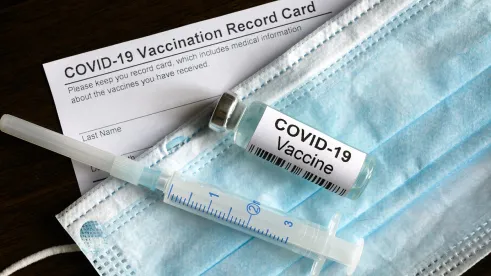As we previously reported, President Biden issued Executive Order 14042 (the Order), which mandated that employees of contractors and subcontractors performing work on federal contracts be fully vaccinated against COVID-19 by January 18, 2022. Challengers from seven states—Georgia, Alabama, Idaho, Kansas, South Carolina, Utah and West Virginia (the Plaintiff States)—and various state agencies, filed suit against President Biden and his Administration, seeking injunctive relief against enforcement of the Order. On December 7, 2021, the United States District Court for the Southern District of Georgia granted the motion and issued a nationwide preliminary injunction against the enforcement of the vaccine mandate.
The Court’s Decision
The Court’s decision found that the Plaintiffs were likely to succeed on the merits for a number of reasons. First, President Biden issued the Order under the authority granted by the Federal Property and Administrative Services Act, 40 U.S.C. § 101 et seq. (the Procurement Act), “in order to promote economy and efficiency in procurement by contracting with sources that provide adequate COVID-19 safeguards for their workforce.” Under the Procurement Act, the President has authority over administrative and management issues that involve the Government as a whole. Even though the Procurement Act bestows broad authority upon the President to ensure economy and efficiency in federal contracts, the Court found that the mandate was a step too far.
The Court found that the Order constitutes an “extreme economic burden” on the Plaintiffs—particularly because employers could lose federal contracts for failing to comply with the Order, and employees could lose their jobs for failing to become vaccinated. This, in turn, would impact the economy at large, as contractors and members of the workforce would not be able to perform federal contracts throughout the country.
Furthermore, the Court stated that Congress has not clearly or expressly authorized the President, through the Procurement Act, to issue the vaccine mandate as provided in the Order. Instead, in the Court’s view, the Order acts as a regulation of public health, which exceeds the scope of the Procurement Act. Even if the Procurement Act does provide such authority, the Court alternatively found that there is no sufficient nexus between the vaccination requirement and the purpose of the Procurement Act.
Second, the Court found that Plaintiffs would suffer irreparable injury because of the compliance costs associated with the Order. The Order requires significant administrative costs and effort by employers, including: (i) identifying whether their employees or subcontractors are covered by the Order; (ii) determining whether their employees and subcontractors are in compliance (i.e., fully vaccinated); and (iii) processing requests for accommodations or exemptions and tracking those that are submitted and granted. The Court found that the time and effort in complying with the Order “appear to be irreparable.”
Third, the Court found that when balancing the harms, Plaintiffs faced greater risk. The Court held that by failing to enjoin the Order, employees would be faced with the decision to get vaccinated or lose their jobs. Employers faced a similar decision to comply with the Order or lose a government contract. In the absence of an injunction, Defendants would simply be left in status quo: employers would be free to encourage employees to get vaccinated, and employees would have free choice to do so. “[R]equiring compliance with [the Order] would likely be life altering for many of Plaintiffs’ employees.” For the same reasons, the Court also found that it is in the public interest to enjoin the Order.
Finding that Plaintiffs were likely to succeed on the merits, the Court did not entertain Plaintiffs’ further arguments that the Biden Administration failed to comply with the Administrative Procedure Act’s notice-and-comment requirements with respect to the Task Force Guidance and the FAR Deviation Clause, or that the Order exceeds the federal government’s authority under the non-delegation doctrine, as intruding on state sovereignty. The Court did, however, express that other courts have agreed with some of the Plaintiffs’ concerns in their claims.
What Employers Subject to the Order Should Do Now
In light of the Court’s ruling, employers may wish to continue the process of determining whether they would be subject to the Order in the event the stay is lifted. Moreover, in states where collecting employee vaccination information is allowed, employers should consider continuing such efforts. Employers should also consider having procedures in place to act on accommodation or exemption requests.
A number of states, however, recently have passed legislation that would restrict or prohibit employers’ efforts to enforce mandatory vaccination policies or collect vaccination status. Thus, employers should be mindful whether they operate in any of these jurisdictions, and adjust their compliance plans accordingly to avoid potentially violating state law.
We will continue to monitor the ongoing developments regarding federal government-mandated vaccinations and remain available to assist companies in determining the applicability and implementation of the Order’s requirements.
*Kamil Gajda, Law Clerk – Admission Pending (not admitted to the practice of law) in the firm’s New York office, contributed to the preparation of this post.






 />i
/>i
